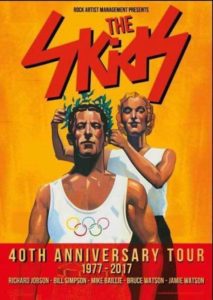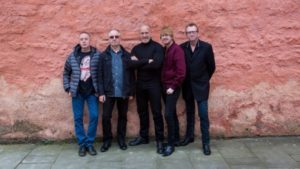Dave Woodhall talks to Skids fromtman and legendary dancer Richard Jobson.

The Skids were one of the most talented punk bands. Unlike many of their contemporaries they’ve resisted calls to reform, except for the odd one-off appearance, until now but they’re touring the UK and play the Robin 2 on Thursday 22nd June.
I’d normally be asking how the tour’s going but thanks to the glories of modern technology I can see most of the previous gigs on YouTube.
“I guess so and hopefully that transmits some of the energy we’re producing on stage.”
There does seem to be some great shows and some enthuasiastic audiences, but does it ever annoy you when you’re playing to an audience that’s filming you on their phones?
“You spend hard-earned money to watch a gig through a phone. It’s very odd. It’s worrying but you’ve got to accept it. I’d never do it, I want to watch the performance but there you go.”
You’ve played a few shows in the past ten years or so but this is the first proper tour. Why now?
“The previous gigs were one-off events such as T in the Park as a tribute thing to Stuart Adamson. We’ve been asked to tour but I was never really sure if the interest was there so this time with the fortieth anniversary of the band we thought we’d play a couple of dates and that became a lot of dates in Ireland as well as all over England. It was a bit of a risk but it’s paid off. We’ve taken it seriously, we want to go out and perform our songs in the way that they should be performed and it’s been an amazing experience.”
After thirty years of punk we were saying that there surely can’t be a fortieth anniversary but here it is and it’s still happening.
“The music’s still alive. Other eras were slightly less serious but punk was political, it had an edge that has never been replicated. Some genres have had that edge, such as hip hop or grime but in rock’n’roll terms things have got very, very soft and nothing like what punk represented. Maybe that’s why bands like ourselves are back playing songs that are genuinely proficient in that. If we’d just gone out and hid behind our guitars and expected people to turn up just for the nostalgia I wouldn’t have been interested. You need to be a bit more fresh and real and I genuinely think it’s got that.”
Some of the bands that have been playing again for years are like watching cabaret. Is there something a bit wrong that we’re still having to do punk at this stage?
“You mean nothing’s taken up the mantle? I agree, there are certain areas where people are engaged with the world around them but music is so homogenised and sanitised, and become very corporate that something irreverant and as maverick as punk would almost be impossible now. It’s quite interesting that older bands are still out there. My work’s still small ‘p’ political but it’s something we’ve never shied away from, it’s got that edge but it’s also got a joyousness about it like a celebration and that’s worked pretty well for us.”
Have there been ‘They shouldn’t play without Stuart’ comments?
“Maybe it’s been there online but nothing thats been brought to my attention. Stuart was the musical engine room of the band in creating the sound and that’s something we’ve managed to replicate. Actually, the songs live are sounding better than they did in those days because we’ve got two guitars and the songs were always made for two guitars. Stuart did the rhythm and the lead and having two guitars now we get a much fuller sound so people are hearing the songs as they should have heard them back then. But no-one’s spoke specfically about Stuart’s absence being too much.”
Stuart left the band before the final album, Joy. Was there any way in which you could have patched up your differences and continued working together?
“I don’t think so because at that point he was going in one direction and I was going in another. We remained friends but I was going colder, artier, which eventually became the Armoury Show and Stuart wanted to do something a bit warmer and less abstract which became Big Country. We just went in different directions.”
Did you ever look at Big Country and your old support band Simple Minds, see the best-selling albums and the stadium tours and think “That could have been us”.
“No, in retrospect we split at our peak. We didn’t stop being the Skids when things were going in the wrong direction, they were definitely going right. We didn’t get to America or Europe so it was disappointing that we didn’t give ourselves that chance but things change, and I went off to do different things in my life and I still do. I’ve got an exhibition opening in Scotland this week, I’ve got a new Skids album, there’s a lot going on and that’s the way I like it.
“I don’t really care about the rest. I got a great reward from watching Green Day and U2 cover The Saints Are Coming and seeing them play it in a huge stadium. Actually the gigs on this tour are the right ones for me personally, I don’t like big stages because like talking to people. If I wasn’t on the stage I’d be in the audience. We’re music lovers and that’s one of the things people always liked about the Skids, we were fans as well as the guys making the music. There’s no difference between us and the audience, and these gigs are the right size to do what I want to do.”
Going wildly off-beam, I read once that you were in a football team that had links with Aston Villa.
“That’s right. I was in a team called Leven Royals from Fife and that was a Villa-sponsored team. They used to take kids down and I went to Birmingham for a couple of days in about 1975. We looked around the stadium, they put us up in a local b&b, we met the backroom staff and they told us that if we kept at it we could have got involved furthr, but to be honest I was never good enough and then a year later I joined the Skids.”
At that time you’d have been in the same youth set-up as Gordon Cowans and Gary Shaw, those sort of players. Then again, you’d probably get in the team now. But back to music and the new album. Is it a continuation from, say, The Absolute Game or is it totally different and modern?
“I think it’s more a homage to what went on before. The energy that was there even before Scared to Dance, and the melody of the later records. The music serviced the words rather than the words came first and the titles tell you all you need to know: Into the Void, Burning Cities, Kings of the New World Order, One Last Chance. They’re all kind of talking about a world on the edge of destruction, there’s a nihilistic edge to what’s going on. The words and music are reflections of that.
“Youth’s doing the production. He’s a Premier League producer now but he was keen to help us, he’s a massive Skids fan. There’s a real energy and it’s up there with the old albums with a modern edge.”
 Are the Skids going to continue after the tour finishes?
Are the Skids going to continue after the tour finishes?
“The tour’s going pretty well and today the bookers have asked if we’ll do it again so I’ve not answered that question yet. i want to get a feel for the response to the album, see if I can stop doing other things that I do. The exhibitions’s called Scared to Dance, which is about punk in Scotland and the Skids were right in the forefront ,and I’m doing a movie next year. I don’t want to stop doing those things but I’ve really had a blast and the important thing is I think the audience are finding we’re enjoying ourselves and that means a lot to an audience.”
You’ve not played the Robin yourself but Bruce will have told you about it.
“All these venues have their own qualities. The Robin could be amaing, we’ve not had a bad gig yet. The audience is wanting to participate so you have to go out and stay sharp to keep them from leaving. You mentioned cabaret bands earlier and that’s one thing we’re not. We’re there to deliver and we definitely do deliver. We don’t hide behind the songs, we perform them.”
So that fiftieth anniversary might happen after all?
“You just don’t know, do you? We might need some kind of magic ball to see that but you never know.”
The Skids play the Robin 2, Bilston, on Thursday 22nd June. Tickets


